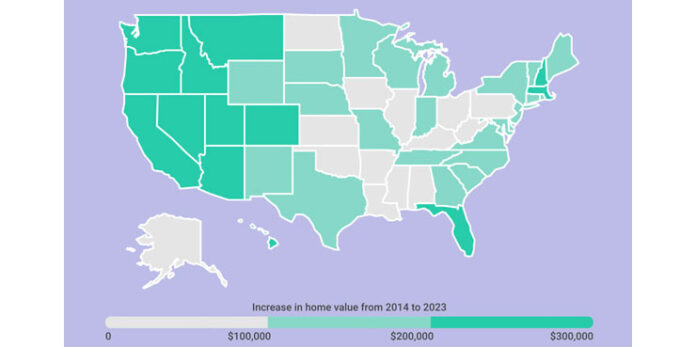House prices have been rapidly rising across the country, but a new report shows that home values in states with recreational cannabis have outpaced home values in other states by $48,983 over the past decade.
In collaboration with Leafly, Real Estate Witch’s data found that the typical home in a recreational state is worth $417,625. This is 41%, or $122,287 higher than non-recreational states. Of the 10 states with the largest increases in home values, seven have legalized recreational cannabis. Meanwhile, of the 10 states with the smallest increases in home values, nine have not legalized recreational cannabis.
Recreational cannabis is currently legal in 24 states and Washington, D.C. Aside from Ohio, which just recently legalized adult-use marijuana, the other 23 jurisdictions have seen property values rise by $185,075 since 2014, compared to $136,092 in states without recreational cannabis.
It’s All in the Data
To gather the data for this study, Matt Brannon, Data Writer at Clever Real Estate and writer of the study, says they used a database of the typical home value in each state for 2014 and 2023, which was provided by the Zillow Home Values Index.
“We subtracted each state’s 2023 average home value from its 2014 average home value to find the typical increase for each state. From there, we did two comparisons: 1) grouping states with legal recreational cannabis vs. those without legal recreational cannabis and 2) those with legal medicinal cannabis vs. those without legal medicinal cannabis,” Brannon says.
Both comparisons showed that the states with the legal form of cannabis have seen home values grow noticeably more — by tens of thousands of dollars — than states without legal cannabis.
Americans Eager to Move to Cannabis Friendly States
A 2022 study by Real Estate Witch found that a majority of Americans who live in states where cannabis is illegal (51%) say they’re considering moving to a legal state.
The rapid rise in property values from the 2023 study shows just how eager Americans are to live in cannabis-friendly states. The typical home in a state with legal weed has seen its value appreciate by $185,075 since 2014, compared to $136,092 in states without legalized recreational cannabis, according to the study.
“There are several reasons why people move from non-legal states to legal states. For some people, the legal status of cannabis is enough to persuade them to make the change, especially if cannabis plays a big role in their lifestyle,” Brannon explains. “But other people are moving to these states because of the general economic growth and job opportunities they’ve seen. And a lot of those jobs exist thanks to the growing cannabis industry.”
Recreational Cannabis States are Seeing Green
According to the study, the recreational weed market is projected to generate about $25 billion in sales by the end of 2023. And while the commodification of cannabis is definitely generating profit, it’s also helping to keep unemployment at bay.
Leafly reports there are about 428,000 jobs supported by cannabis in the U.S. That number has grown at a remarkable rate of at least 27% per year since 2017.
“Job opportunities created by cannabis aren’t just limited to positions that involve handling the plant itself,” Brannon notes. “New cannabis businesses require support from other industries, creating opportunities for growth with transportation — e.g. more people needed to drive trucks — security, marketing, and other industries that work behind the scenes. They also see growth, meaning you can expect more economic development in that area.”
The Future of the Cannabis Industry
The Real Estate Witch study shows that the recreational cannabis market has a positive impact on the local economy. Brannon says that data such as this is a great PR for the push to legalize cannabis.
“Even if you don’t use cannabis — if you need to choose between two states to live in, and one of them is rapidly outpacing the other one in important economic indicators, that’s a persuasive reason to move there,” says Brannon.










